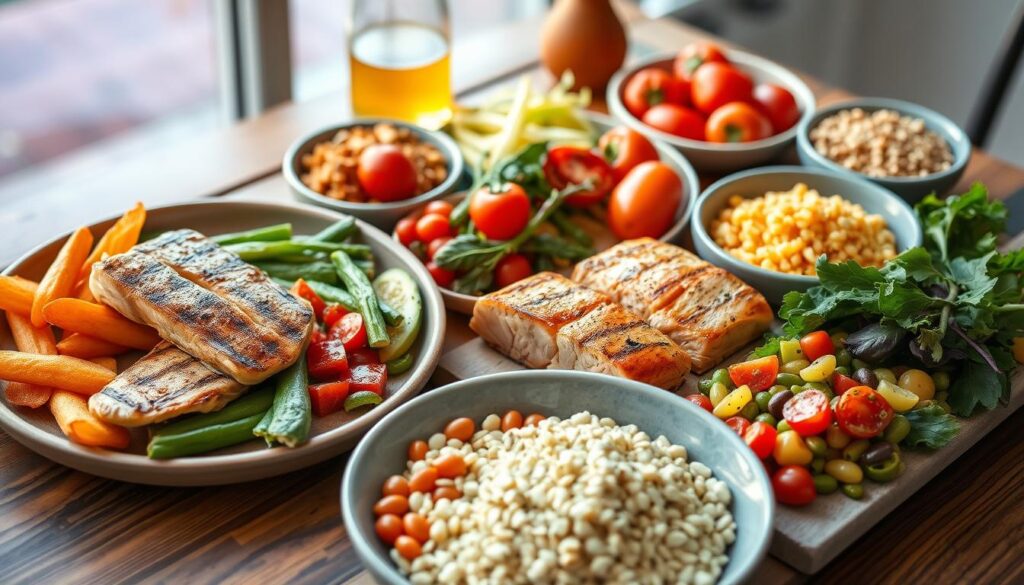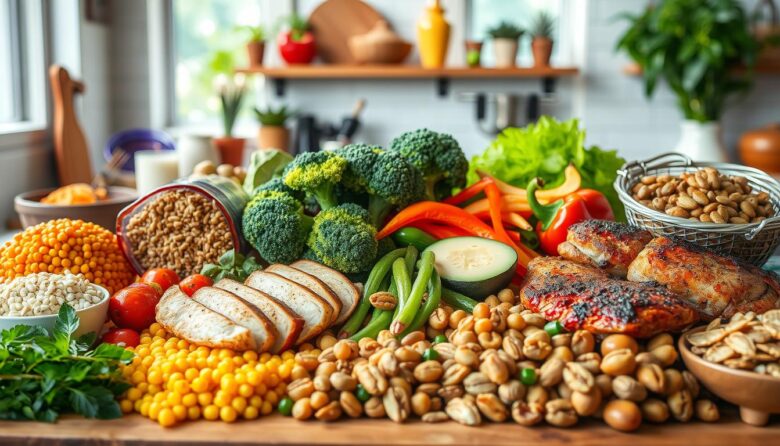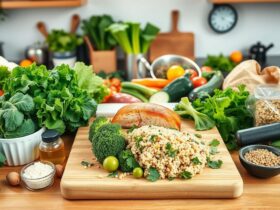Protein is key for health, especially for men over 40. The Dietary Guidelines for Americans 2020–2025 say adult males need at least 56 grams of protein intake daily. Studies show more protein can aid in losing weight, reducing fat, and keeping muscles strong.
Protein is vital for making and fixing body parts. It helps with muscle, bone, and skin repair. It also aids in making antibodies and enzymes, moving molecules, and controlling hormones. A diet rich in protein can boost your metabolism, keep you full, and help keep muscle mass when losing weight.
For aging men, getting enough protein is crucial for health and energy. Knowing your protein needs and following a high protein diet can greatly benefit your life. In the next parts, we’ll dive into the best protein intake, the benefits of a high protein diet, and how to make it a part of your life.
Understanding Protein Needs After 40
As men get older, their protein needs change. This is due to changes in metabolism and muscle loss. The usual protein intake is 0.8 g per kilogram of body weight. But, research shows that 1.2–2 g/kg/body weight might be better for weight loss and muscle health in older men.
Daily Protein Requirements for Aging Men
The federal guideline for adults is 0.8 grams of protein per kilogram of body weight. But, for those over 50, it’s recommended to eat between 1.2 grams / kg of body weight to 1.6 grams / kg of body weight. This is important for keeping muscle mass and preventing muscle loss, also known as sarcopenia.
Impact of Age on Protein Absorption
Our ability to use protein decreases with age. This is called “anabolic resistance.” So, older people need to eat more protein to build muscle like younger adults. Experts say eating at least 30 grams of high-quality protein per meal is key for muscle health in men over 40.
Benefits of Increased Protein Intake
- Prevents age-related muscle loss (sarcopenia)
- Improves bone density and reduces the risk of osteoporosis
- Enhances wound healing and recovery from illness or injury
- Supports a healthy metabolism and weight management
- Boosts energy levels and overall well-being
Getting enough protein intake and doing regular strength training helps older men keep muscle strength and health as they age.
| Age Range | Recommended Protein Intake (g/kg of body weight) |
|---|---|
| 18-30 years | 0.8 – 0.93 g/kg |
| 30+ years | 0.85 – 0.96 g/kg |
| 50+ years | 1.2 – 1.6 g/kg |
| 65+ years | 1.2 – 2.0 g/kg |
High Protein Diet Benefits for Middle-Aged Men
As men hit their 40s and beyond, a high-protein diet offers many health benefits. It helps with weight management, muscle preservation, and metabolic health.
A high-protein diet can make you feel full longer and boost your metabolism. Protein-rich foods digest slowly, keeping you satisfied. This helps prevent overeating and supports a healthy weight.
Protein is key in keeping muscle mass during weight loss. As we age, muscle loss, or sarcopenia, affects our metabolic health. Eating more protein helps prevent this, keeping your metabolic rate healthy and your muscles strong.
Also, a high-protein diet is good for bones, reducing fracture risk, and aids in wound healing. It helps control blood sugar, lowering type 2 diabetes risk. Plus, it’s good for the heart, possibly lowering blood pressure and cholesterol.

In summary, a high-protein diet is a great choice for middle-aged men wanting to improve their health. It offers benefits like weight management, muscle preservation, and better metabolic health.
Best Protein Sources for Men Over 40
As men get older, they need more protein. Protein helps keep muscles strong and supports the body’s functions. There are many good protein sources, both from animals and plants.
Animal-Based Protein Options
Animal proteins are complete because they have all the amino acids we need. Good choices for older men include:
- Lean meats: Skinless poultry, lean meats (such as lean meats), and fish like salmon, tuna, and halibut.
- Dairy products: Low-fat dairy such as Greek yogurt, cottage cheese, and milk.
- Eggs: A versatile source of high-quality protein.
Plant-Based Protein Alternatives
For those who prefer plants, there are great options too. These can provide all the amino acids when eaten together:
- Legumes like lentils, black beans, and lima beans.
- Quinoa, a grain that is a complete protein.
- Nuts and seeds such as almonds, pumpkin seeds, and peanuts.
Protein Supplements and Timing
Protein powders like whey, casein, or plant-based ones can help too. Taking protein at the right times, like before and after workouts, helps muscles grow and recover.
By eating lean meats, fish, dairy, legumes, and using protein supplements, men over 40 can meet their protein needs. This helps keep muscles strong and supports overall health.
Creating Your High Protein Diet Plan
Making a high protein diet plan is key to reaching your health and fitness goals. It’s important to balance protein, complex carbs, and healthy fats. By planning your meals well, you can meet your body’s needs.
Try to have 25-30 grams of protein at each meal, spread over 3-4 times a day. This helps keep muscle mass, keeps you full, and supports your diet. Eat a variety of proteins like eggs, kefir, Greek yogurt, chickpeas, peanuts, and lean chicken.
Add lots of fruits, veggies, and whole grains to your meals. These foods give you fiber, vitamins, and minerals. They also help keep your diet balanced. Always watch your portion sizes to keep your calorie intake right for your goals.
A sample daily high protein diet plan might include:
- Breakfast: Eggs and whole-grain toast
- Lunch: Chicken salad with leafy greens
- Snack: Greek yogurt with fresh berries
- Dinner: Grilled fish, quinoa, and roasted vegetables
By sticking to a high protein diet plan, you can meet your body’s needs. This helps you stay healthy and reach your goals.

Combining Exercise with High Protein Diet
Adding a high-protein diet to your workout routine, especially strength training, boosts benefits for men over 40. Strength training helps build muscle, and eating enough protein makes it even better. Try to do 2-3 strength training sessions a week for the best results.
Resistance Training Synergy
Resistance training is key for middle-aged men’s fitness. It builds strength training and muscle building, improves insulin sensitivity, and cuts body fat. A high-protein diet with resistance training boosts these benefits, leading to better body shape and performance.
Recovery Nutrition Protocol
Good post-workout nutrition is vital for muscle recovery and growth. Eat 20-30 grams of protein within 30 minutes after working out. This helps repair and grow muscles. Also, add carbs to your meal to refill glycogen stores and aid recovery.
Performance Optimization Tips
- Stay hydrated: Drink enough water before, during, and after workouts to help with performance and recovery.
- Time your protein intake: Eat a protein-rich meal or supplement before and after strength training to get the most anabolic benefits.
- Prioritize sleep: Get 7-9 hours of quality sleep each night to help your body recover and adapt to training.
By mixing a high-protein diet with a full exercise plan, men over 40 can improve muscle, strength, and health. Adding resistance training, proper nutrition, and other strategies can help reach fitness goals and stay active later in life.
Conclusion
Adding more protein to your diet can really help men over 40. It keeps muscles strong, boosts energy, and improves health. It’s important to eat whole, nutritious foods and exercise regularly too.
Changing your lifestyle for the long term is better than quick diets. Talk to a doctor or dietitian to make a plan that fits your health goals. This way, you can stay healthy and feel great for years to come.
More protein, a healthy diet, and exercise can make a big difference. You’ll see better body shape, more energy, and feel more alive. Start this journey to a healthier, more vibrant life today.










